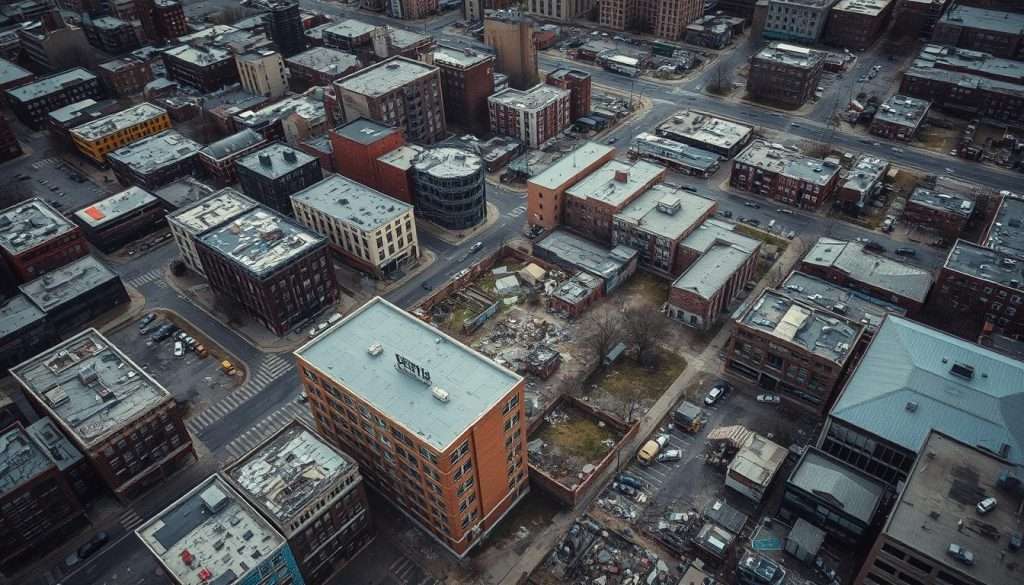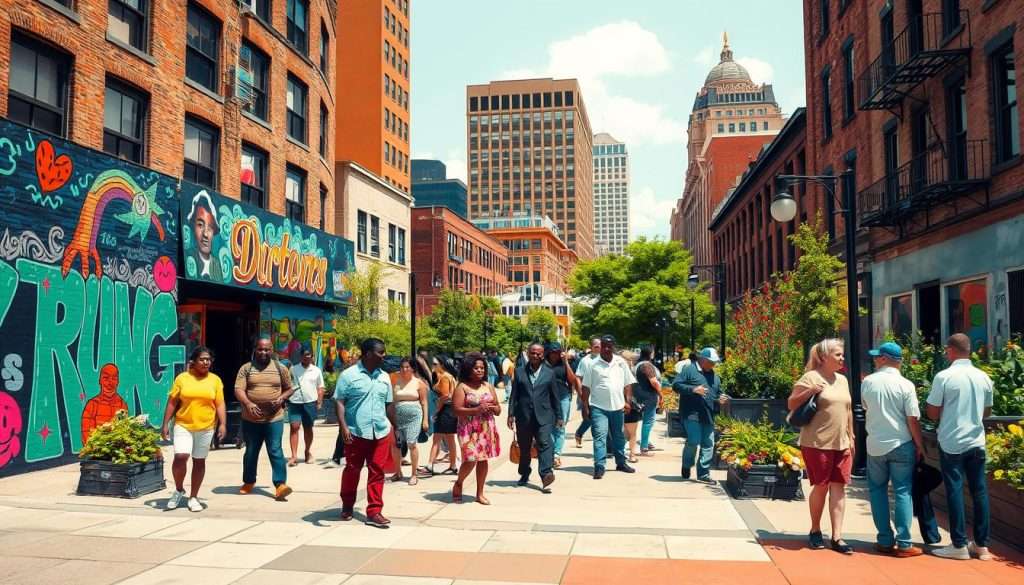Detroit, known as the “Motor City,” has a rich history and culture. But, many wonder, “how dangerous is Detroit?” It’s key to understand the safety in Michigan’s Motor City. Detroit has seen big changes in economy and society, affecting its safety.
Crime rates in Detroit are high, making it one of the riskier cities in the U.S. Yet, there are safe spots in the city. Places like Belle Isle and Eastern Market are vibrant and safe. Detroit is changing, welcoming visitors with a few safety tips.
Understanding Detroit’s Crime Rates
To really understand safety in Detroit, we need to look at the city’s crime stats. These numbers show the city’s struggles and recent wins. They tell us how Detroit is getting safer.
Recent Statistics and Trends
In 2021, Detroit was very dangerous, with a violent crime rate of 1,965 per 100,000 people. But in 2023, things changed for the better. Violent crime dropped by 15.2% in early 2024 compared to 2023.
Property crime also fell by 15.1% in the same period. Yet, property crimes are still a big problem, with over 3,000 per 100,000 people. This is much higher than the national average.
Comparing Detroit to Other Major Cities
When we compare Detroit to other big cities, we see interesting facts. Detroit is known for high crime, but it’s not alone. Many cities face similar issues.
In 2019, Detroit had a property crime rate of 4,299.7 per 100,000 people. This is much higher than the national average. Other cities have found ways to improve safety. Detroit might learn from them.
| City | Violent Crime Rate (per 100,000) | Property Crime Rate (per 100,000) |
|---|---|---|
| Detroit | 1,965 | 4,299.7 |
| St. Louis | 2,080 | 3,000 |
| Chicago | 1,753 | 2,970 |
| Los Angeles | 1,022 | 2,650 |
| New York City | 513 | 1,724 |
These comparisons help us see Detroit’s crime situation better. The city’s efforts are showing results. But, it’s important to keep watching how crime rates change to make Detroit safer for everyone.
Neighborhoods to Avoid
Traveling through Detroit? Knowing which areas to avoid is key for a safe trip. The city has many neighborhoods with safety concerns. Staying informed about these areas can help you have a safer visit.
Understanding the Hotspots
Detroit’s crime rate is about 60 crimes per 1,000 people. This is much higher than the national and state averages. Belmont has a crime rate of 14,048 per 100,000, which is 664% higher than the national average.
Petosky-Otsego has a crime rate of 13,342 per 100,000, 626% higher than the state average. Other areas like Van Steuben and Fishkorn also have high crime rates. These areas are hotspots where you need to be careful.
Safety Precautions When Traveling
When visiting less safe areas, it’s important to stay safe. Avoid using ATMs in these areas to prevent theft. Stay alert and try to blend in with locals to avoid drawing attention.
It’s a good idea to share your travel plans with friends or family. This way, someone knows where you are. Also, keep your valuables safe and hidden to stay safe while exploring.

| Neighborhood | Crime Rate (per 100,000 residents) | Higher Than National Average (%) |
|---|---|---|
| Belmont | 14,048 | 664% |
| Petosky-Otsego | 13,342 | 626% |
| Van Steuben | 12,742 | 593% |
| Fishkorn | 12,451 | 577% |
| Warrendale | 12,432 | 576% |
Safe Areas for Tourists
Visiting Detroit is exciting. You can explore neighborhoods with rich culture and safety. Many areas are safe for tourists, offering great dining and attractions.
Best Neighborhoods to Explore
Here are the safest neighborhoods for tourists:
- Midtown: It’s the safest area, with a crime rate 60% lower than the city average. You’ll find cultural spots like the Detroit Institute of Arts and tasty food.
- Corktown: This historic area is both charming and modern. With homes valued at $455,500 and a crime rate 8% lower than the U.S., it’s great for dining and shopping.
- Palmer Woods: It’s known for beautiful homes and a family-friendly vibe. With a median rent of $900, it welcomes all visitors.
- Rivertown: It offers good value and safety, with a violent crime rate of 871. Enjoy waterfront views and local amenities.
Local Favorites and Attractions
Enjoy Detroit’s attractions in these safe neighborhoods:
- Detroit Institute of Arts: A top museum in Midtown, it’s a cultural gem.
- Motor City Sound: Experience the city’s music at local shows.
- Restaurants and Bars: Try Slows Bar BQ in Corktown or Midtown’s cafes for delicious food.
Transportation Safety Tips
Exploring Detroit means knowing how to stay safe. Public transportation safety is key. Here are tips for a safe trip.
Navigating Public Transit Wisely
Detroit’s public transit is good but needs care. Over 40% of crashes happen on just 3% of streets. Pick bus stops carefully.
Most bus stops lack shelters, making waiting tough. The QLine streetcar is unique but watch for safety updates. Detroit is working to make streets safer for everyone.
Best Options for Rideshare Services
Uber and Lyft are great for evening rides. They offer comfort and security with ratings and tracking. With more car crashes, rideshare is a smart choice.
Local businesses support rideshare, cycling, and public transit. Stay updated on Detroit’s transportation safety changes.
| Transportation Options | Safety Features | Considerations |
|---|---|---|
| Public Buses | Lack of shelters at 90% of stops | Watch for traffic; use caution during peak hours |
| QLine Streetcar | Improved pedestrian safety initiatives ongoing | Check schedules and plan ahead |
| Rideshare Services | Real-time tracking and driver ratings | Confirm identity of the driver and vehicle |
Personal Safety Measures
Traveling to Detroit can be fun, but safety is key. Following good safety tips can make your trip better and safer. Always be careful, especially in busy places or at night.
Staying Alert and Aware
When you’re out in the city, stay alert. Here’s what to do:
- Always be aware of your surroundings.
- Avoid isolated areas after dark.
- Stick to well-lit streets and busy areas.
Knowing about local crime helps too. Detroit has a higher crime rate than most places. It’s smart to know where crime happens and avoid those areas.
Emergency Contacts and Resources
Knowing who to call in Detroit is important. Here are some numbers you should have:
| Service | Contact Number |
|---|---|
| Detroit Police Department | 911 (emergency) |
| Detroit Fire Department (EMS) | 911 (emergency) |
| Non-emergency Police Line | (313) 267-4600 |
Having these numbers ready is crucial for emergencies. For more tips, check out things to know before traveling to. This guide has great safety tips for Detroit and smart travel advice.
Cultural Perception of Safety
Detroit’s culture shows a mix of feelings about safety. People see a tough side but also a strong community spirit. This mix shows how locals view their city.
How Locals View Their City
Many Detroiters feel both worried and hopeful. Even with high crime rates, they still love their city. They stay safe by being careful but still hopeful.
They see Detroit as a place with both problems and chances for betterment. This view shows the city’s potential.
The Impact of Media Representation
How Detroit is shown in the media affects how people see it. Often, crime gets more attention than good news. This can make people think the city is more dangerous than it is.
This gap between what media says and what locals experience makes safety views complex. It shows the city’s true nature is more than just crime.

| Year | Violent Crime Rate (per 100,000) | Murder Rate (per 100,000) | % Victims Reporting Crime |
|---|---|---|---|
| 2020 | 2,200+ | 50 | – |
| 2021 | – | – | 28% |
| Oakland County | – | 4.2 | – |
Resources for Visitors
Knowing about local support can greatly improve your visit to Detroit. Many visitor safety services are ready to help. These come from local law enforcement and community groups.
Local Law Enforcement Contact Information
Reaching out to Detroit’s law enforcement can get you quick help. The Detroit Police Department is always ready to assist. They work hard to keep everyone safe.
If you need help right away, call 911. For more information, visit the Detroit Police Department’s website. It’s a great place to find law enforcement resources in Detroit and learn about safety efforts.
Tourist Assistance Services Available
Detroit offers many tourist assistance in Detroit programs. The city has welcome centers open to help visitors. For example, the Detroit Welcome Center is open Monday to Friday from 8:30 a.m. to 5 p.m. EST.
Michigan has 14 welcome centers along major roads. They help over 5 million travelers each year. These centers are key for getting the help you need.
Programs like Project Lighthouse connect visitors to safety partners 24/7. Businesses act as safety ambassadors, helping from shelter to law enforcement. This program builds a safe and trusting community for all visitors.
Stay updated, use the available resources, and ask for help when needed. This way, you can have a great trip to Detroit.
| Welcome Center | Hours of Operation | Location |
|---|---|---|
| Detroit Welcome Center | Mon-Fri: 8:30 a.m. – 5 p.m. EST | Detroit, MI |
| Clare Welcome Center | 7 days a week: 8 a.m. – 4:30 p.m. EST | Clare, MI |
| Iron Mountain Welcome Center | 7 days a week: 7:30 a.m. – 4 p.m. CST | Iron Mountain, MI |
Conclusion: The True Nature of Detroit
Detroit is a city full of life and challenges. It has a rich history of overcoming hard times. The city has changed a lot, from a busy industrial center to a place full of new life.
While there are safety concerns, Detroit also offers many chances for fun and connection. Every city has its problems, but Detroit is also full of adventure.
Embracing the City with Caution
Exploring Detroit safely means being careful but also curious. By following travel advice, visitors can enjoy the city’s culture and history. Detroit is known for its food and art, and being prepared makes the experience better.
Final Thoughts for the Adventurous Traveler
Travelers should be brave and open-minded in Detroit. With the right attitude, they can see the city’s true beauty. Detroit’s spirit and new chances make it a great place for memorable experiences.
